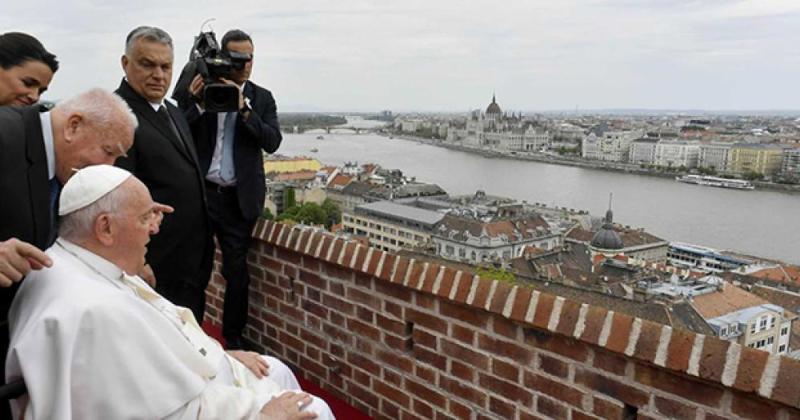Over the course of the three-day visit by Pope Francis to the Hungarian capital, Budapest, it was designed to meet with the local Catholic Church, led by Cardinal Peter Erdo, as well as to deepen diplomatic relations between the Holy See and Hungary, while holding two meetings with the country's new president, Katalin Novak, and Prime Minister Viktor Orban.
What draws attention is that Pope Francis--who is burdened with years, health, and a long life, God willing--has focused on Hungary's role in extending bridges of communication in the first place with the refugees and the displaced, as well as among European countries, by focusing on Budapest, the city of history and the city of saints, and also the city of bridges, in addition to the “Pearl of the River” Danube" as he referred to it, and talked about its importance as a bridge among peoples. This is what prompted me to openly address this historic visit, for at the time when the Pope's motorcade was crossing the bridges of Budapest I wanted to talk about the characteristic of bridges which have become a culture, as Francis' predecessors used to say, namely John Paul II and Benedict XVI, "We must adopt a culture of building bridges not a culture of building walls."
As for the bridge, Pope Francis spoke of Europe as a whole, and not only of Hungary, by stating that it should not be individual ones as fragmented countries, but that there should be this cooperation among countries and cooperation among the different races that constitute the extended European unity. But with regards to Hungary, he talked about the bridges among the Churches in their ecumenical dimension and the dialogue with the different religions, as well as the countries and races that come to Hungary. We, in Jordan, are frankly proud to have a large number of students who studied over the past years, and are currently studying, in Hungarian universities due to the distinguished educational standard there. Many thanks go to the great cultural efforts exerted by the Hungarian embassy in Amman, currently represented by Ambassador Attila Kali, as well as the Honorary Consul of Jordan in Budapest, Mr. Zaid Naffa, who exerts extensive efforts to obtain scholarships for our students, in cooperation with the Ministry of Higher Education in Jordan, in addition to his persistent encouragement of tourism to Jordan, and his influential presence on the social, cultural and political arenas.
We badly need “a culture of bridges” in our lives, as well as a culture of communication, a culture of joint work and cooperation among peoples so as to accomplish huge or small tasks in this life. The culture of bridges means cooperation, respect, and a constructive spirit, implying that every person should consider oneself a contributor to building human civilization, not with an individual spirit, but with a collective spirit. Pope Francis asked Hungary and its neighbors never to close the doors, but to open them. Of course, this requires political decisions, and not just social decisions to admit refugees, whereby Hungary hosted in the past year some 1.5 million refugees, most of them from Ukraine. We know, as experienced in our country, the great burdens borne by the host countries for people fleeing the inferno in their countries.
This visit is an occasion to pay tribute to the Hungarian government which was the only country that has made financial contributions for completing the construction of the Church of the Baptism of Lord Christ at the Baptism Site, a measure that benefits pilgrims spiritually and bring economic benefit to our country. Thus, our website abouna.org-based in Jordan, has sent a delegation of three journalists to Hungary to cover the Pope's visit, as a token of gratitude and appreciation to this European country that extends a solid bridge of friendship with our society and churches in our beloved country, Jordan.
Long live the culture of building bridges, and long live those who promote them ...
